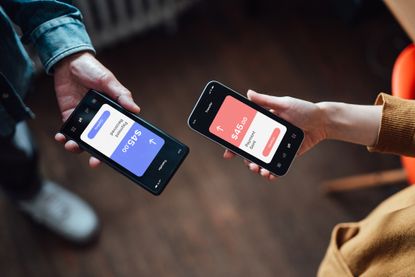Storing Money in PayPal, Venmo or Cash App Carries Hidden Risks, CFPB Says
The Consumer Financial Protection Bureau looked at key government protections for your funds in apps like PayPal.


Mobile payment apps like PayPal, Venmo and Cash App have exploded in popularity in the last several years. Convenience, transaction speed, and flexibility across multiple smartphone types offer consumers an easier way to pay for services and split bills with friends and family. The pandemic further accelerated this ongoing shift toward a cashless future.
However, recent bank and crypto exchange failures highlight the risk of keeping your funds in accounts that exceed or simply lack FDIC insurance coverage. A recent report from the Consumer Financial Protection Bureau (CFPB) casts a spotlight on deposit risks among popular mobile payment apps, while explaining how consumers can hedge their risk of a collapse.
Funds in PayPal, Venmo, CashApp lack insurance
Earlier this year, the collapses of Silicon Valley, Signature and First Republic Banks highlighted the importance of federal deposit insurance offered through the FDIC or NCUA. These banks experienced catastrophic runs, but their insured depositors with account balances of up to $250,000 could have confidence their money was safe. However, similar protection would not be guaranteed to customers that store money on nonbank payment apps, as we saw from the near-total wipeout of FTX users after the giant crypto exchange collapsed last year.

Sign up for Kiplinger’s Free E-Newsletters
Profit and prosper with the best of expert advice on investing, taxes, retirement, personal finance and more - straight to your e-mail.
Profit and prosper with the best of expert advice - straight to your e-mail.
The new CFPB report finds that billions of dollars stored in the top payment apps may lack the same federal insurance coverage that protects users of standard U.S. banks and credit unions from total ruin in a crisis.
The CFPB report breaks down the deposit insurance representations of each major payment app provider. The table below illustrates the spotty or nonexistent status of insurance coverage across the payment app landscape:
| Provider | Account Type | Deposit Insurance Eligibility |
|---|---|---|
| PayPal | PayPal account | None |
| PayPal | PayPal Balance account | "Funds are eligible for pass-through insurance if the customer engages in certain activities using the account, including opening a PayPal debit card account, enrolling in direct deposit, or using the account to buy or receive crypto assets." |
| Venmo | Venmo Account | "Funds are eligible for pass-through insurance if the customer engages in certain activities using the account, including adding funds using direct deposit or the cash a check feature, or using the account to buy or receive crypto assets." |
| Cash App | Cash App Balance account | "Funds are eligible for pass-through insurance if the account is linked to a Cash App prepaid card or the account sponsors/is a Sponsored Account." |
| Apple Pay | Apple Cash account | "Funds are eligible for pass-through insurance if the customer registers the account with Green Dot Bank." |
| Google Pay | Google Pay account | None |
| Google Pay | Google Pay Balance Account | None |
The CFPB calculates that more than three quarters of U.S. adults have used a payment app. Users transacted roughly $893 billion in 2022 across all payment apps, and they're projected to increase transaction volume to $1.6 trillion by 2027. So the risks to users of disrupted funds access or insolvency will only grow into the future.
Next steps for payment app users
The CFPB offers several tips for payment app users to protect their funds from deposit risk:
Read the user agreement
The user agreement, as murky as it can be, should explain the app's basic business model, investment strategy and risk profile. Check if the payment app company keeps your money in a bank or credit union account or invests your money in loans and bonds. You may be surprised to learn that they earn interest on your money without passing any of it on to you, like a normal bank normally does. Also check for details on whether your money may be insured at a bank or credit union, as well as what happens in the case of the payment app’s collapse or bankruptcy.
Consider the offered "pass-through" insurance
Certain apps offer specific pass-through insurance, which protects you against the collapse of the bank or credit union where the company holds your funds. If you follow the insurance criteria, this can offer an additional layer of protection for app users. However, pass-through coverage explicitly doesn’t protect you against PayPal or another app failing. Even if your money is stored safely in an external, FDIC-backed bank during a payment app collapse, you could still experience significant delays in accessing your funds.
Move your money out regularly
Regularly transfer your existing balance from the payment app holding fund into your FDIC-insured linked funding account. Try to check your balance at least once per month to not miss any outstanding funds from that group dinner or grocery run. Use an app like Apple Reminders or Google Calendar to set up recurring nudges for yourself.
Related Content

Ben Demers manages digital content and engagement at Kiplinger, informing readers through a range of personal finance articles, e-newsletters, social media, syndicated content, and videos. He is passionate about helping people lead their best lives through sound financial behavior, particularly saving money at home and avoiding scams and identity theft. Ben graduated with an M.P.S. from Georgetown University and a B.A. from Vassar College. He joined Kiplinger in May 2017.
-
-
 Putting Catch-Up Contributions Into a Roth 401(k) Isn't a Bad Idea
Putting Catch-Up Contributions Into a Roth 401(k) Isn't a Bad IdeaRoth 401(k) High earners will be required to put their catch-up contributions in a Roth 401(k).
By Sandra Block Published
-
 Work Email Phishing Scams on the Rise: The Kiplinger Letter
Work Email Phishing Scams on the Rise: The Kiplinger LetterThe Kiplinger Letter Phishing scam emails continue to plague companies despite utilizing powerful email security tools.
By John Miley Published

